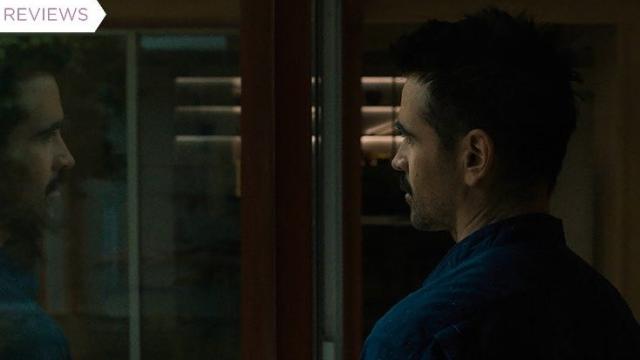We often think of sci-fi films as bombastic, grand canvases for spaceships, lasers, and robots. But After Yang, the new film by South Korean-born filmmaker Kogonada, uses a handful of those elements to be grand in a whole other way. It’s an emotionally fulfilling story of family and loss set in a fascinating world bursting at the seams with possibility. A world where robots exist among us, and one of them, the titular character Yang, impacts a family in deep, relatable, beautiful ways.
After Yang stars Colin Farrell as Jake, a husband and father who runs a tea shop. He and his wife Kyra (Jodie Turner-Smith) have an adopted daughter named Mika (Malea Emma Tjandrawidjaja) who they feel ill-equip to teach about her Chinese heritage. So they purchase Yang (Justin H. Min) an artificial sibling who acts as older brother and teacher for Mika. One day though, Yang malfunctions, and as Jake sets out to fix him, he realises Yang isn’t the only one who needs fixing.
Following a very memorable, hilariously out of place opening credits sequence, After Yang feels like a dream. There’s always a light drizzle on screen. The lighting makes everything feel warm. Characters live on sets designed as sparse but homey. And the dialogue is almost exclusively spoken at softer volumes, adding a certain respect and importance to each word. Wrapped up in those soothing aesthetics, Kogonada’s world is sumptuous and provocative. It’s a world that’s at times familiar but is punctuated with wide shots and bits of technology that mark the setting as futuristic. A place we want to learn more about.
The biggest of those futuristic clues, of course, is Yang. And as Jake takes Yang’s lifeless robot body around, we learn that these beings are special. They’re not just mindless, or even mindful, robots. They’re referred to as technosapians, were created by one mysterious corporation, and are studied by the scientific community with infinite wonder. This company has a monopoly on the beings, and that creates all sorts of problems for Jake, who is trying to cut costs. Eventually that journey leads him to a shocking discovery: Yang didn’t just take care of his daughter. He had a life of his own and the revelation humanizes Yang in ways Jake never could’ve imagined.
All of this is incredibly intriguing, and as its told within a tranquil filmmaking style, After Yang sucks its viewer right in. It really gets good when Jake’s exploration and Yang’s past begin to intersect at several universal lessons and themes. Things like how important it is to treat others kindly. The power of memory. The pain of the past. Possibilities of the future. Mysteries of science, religion, all of it gets touched upon. Jake learns more about Yang when he’s incapacitated than he ever did when he was awake, and the regret and sadness of that changes his views on his wife, daughter, and the world.
In the end, After Yang offers ambiguity. We don’t learn a ton about this futuristic world, these artificially intelligent creatures, or even what’s next for Jake and his family. But that decision is almost exactly the point. After Yang gives us a way to think about many aspects of life in an engaging, powerful way, without providing the answers. Because often there aren’t answers. And as a result, you’ll be thinking about After Yang mesmerising narrative and style long after you finish watching it.
After Yang had its U.S. premiere at the 2022 Sundance Film Festival. There’s no word yet on an Australian release date.
